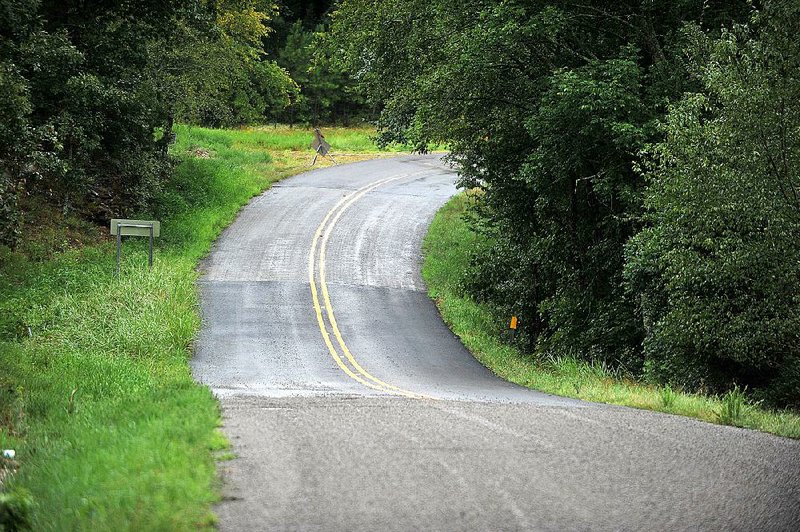To stretch its maintenance dollars during a time of uncertain revenue, the Arkansas Highway and Transportation Department has turned to a tried-and-true material to help refresh some of its busier roads: gravel.
No, the agency isn't going back to building gravel roads although it may seem that way to some motorists whose untrained eyes fail to recognize they are driving over a fresh "chip-seal" project -- typically a mixture of gravel and liquid asphalt.
Chip-seal projects are a common sight on county roads and, until now, have been limited on state highways to low-volume secondary routes in rural areas. But with the elimination of the department's $50 million annual overlay program, which is a heavier maintenance program targeting high-volume highways, chip-seal work is shifting to those roads, often in more urban areas.
The overlay program was eliminated because Congress couldn't reach a deal on long-term federal funding for road and bridge construction. The department also has pulled 76 projects worth $335 million from its bidding schedule.
The move to gravel has generated complaints from motorists unfamiliar with the treatment, as department personnel can attest after recent chip-seal applications on highways near Jonesboro and Benton. But as the agency's director, Scott Bennett, said in a memo to the department's district engineers last month, the treatment "requires motorists to drive on loose gravel for several days" and leaves them with the impression the work has "altered a smooth asphalt pavement into an inferior surface."
Last month, a Jonesboro television station produced a segment on the "gravel" section of Arkansas 141, also called Culberhouse Road, just outside the Jonesboro city limits.
It also prompted some comment on social media. "I'm 99.99% sure that my death is going to be due to getting [run] over on Culberhouse Rd. because I refuse to go 50 [mph] on a gravel road," one motorist posted on her Twitter account.
A chip-seal project takes some adjustment for drivers. The liquid asphalt is applied to the road surface and acts as a binder for the chips, which is the gravel or, in some cases and depending on location, crushed limestone. Together they fill in the cracks and develop a driving surface that has more friction and is safer for travel.
For a few days, loose gravel is left on the roadway because it takes some time before the gravel is fully bonded to the roadway surface. The time varies with the length of the section being surfaced and weather conditions, the department said. Therefore, it recommends reduced speeds for two weeks after the work. Eventually, department personnel sweep the remaining loose gravel from the roadway surface.
"It will look like a paved road," said Mark Bradley Smithee, who is the maintenance engineer for District 10, which covers Clay, Craighead, Greene, Lawrence, Mississippi, Poinsett and Randolph counties. "It's a tool that can be used anywhere and everywhere."
District 10 personnel concluded that Arkansas 141 on both the north and south sides of Jonesboro was an "excellent candidate" for chip-seal projects given its wear and given the absence of an overlay program. "A few years ago, we might not have done it," Smithee said.
But the district was unprepared for the initial reaction.
"They truly thought we had put down a gravel road," Smithee said. "We thought it looked very good and served its purpose. Not everyone agreed."
To head off future complaints, Bennett is requiring the department's 10 highway districts to notify the agency's public information office of the work so it can issue news releases and inform local elected officials whenever chip-seal work is performed on state highways that carry more than 3,000 vehicles a day.
The department issued a news release for a chip-seal project, more formally known as a bituminous surface treatment, on a section of Arkansas 27 in the northwest corner of Hempstead County from the Howard County line near Nashville to the Pike County line toward Murfreesboro, a route that carries 3,500 vehicles daily, according to agency figures. The work will begin Monday and last from 7 a.m. to 5:30 p.m. daily through Thursday, weather permitting.
Traffic will be reduced to one lane within the work zone, the department said.
Chip-seal projects are much less expensive than the overlay projects, which add a layer of asphalt to high-volume roads to delay the need to rebuild for a few years, and are part of the department's $9 million annually sealing program.
Each of the agency's 10 districts receives, on average, about $900,000 under the program. The average contract for a chip-seal project is about $32,000 per mile for a two-lane road, according to Danny Straessle, a department spokesman. An overlay costs between $176,000 and $186,000 per mile on a two-lane road, he said.
Part of the difference is that the costs associated with a chip-seal project include only the materials because the work is done by department maintenance personnel, Straessle said. Typically, overlay projects are done by private contractors.
The chip-seal program is a "valid alternative to an overlay program when the road in question doesn't have any serious issues," said Kevin Hall, the chairman of the civil engineering department at the University of Arkansas in Fayetteville and an expert in pavement design. "It's a good strategy" to pursue in light of the funding uncertainties, he said.
Chip-seal projects generally can't replace overlay projects. The former is targeted to roads that "need a new surface" while overlay projects also "add structure to the pavement and [increases] its load-bearing capacity," Hall said.
"For pavement that needs extra structure, [chip-seal projects] won't help," he added. "But if you look at the life-cycle costs, they are very competitive."
Metro on 08/06/2015
